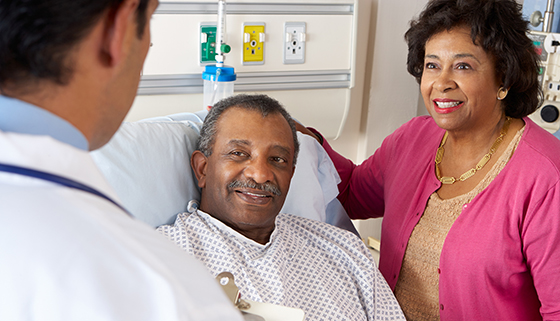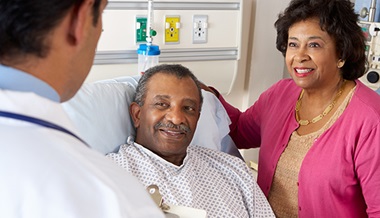Radiation Therapy for Lung Cancer: Ricardo's Story
Growing up in Washington, D.C., Ricardo Ricks always had strong support from his family and his larger church community. Those relationships are among the tools he has called upon during his several-year fight against lung cancer.
Ricks was first diagnosed with lung cancer in 2010. By that time he had relocated to Baltimore and, after many years working as a teacher, was helping a friend with the necessary paperwork to gain licensure for a psychiatric rehabilitation program. A smoker since age 11, Ricks had begun coughing up specks of blood. As that worsened and he felt poorly, he went to the Emergency Department at The Johns Hopkins Hospital, where doctors ordered a chest X-ray and recommended he see a lung specialist. Although that doctor told him he had stage 3 lung cancer and would be in for a long journey, Ricks says the news didn’t sink in.
“I don’t live with cancer; cancer lives with me. That’s my mantra.”
Ricks
“I didn’t really process cancer,” he says. “I didn’t know anyone personally who had cancer, and had never spoken with anyone who could describe what their experience was like.” He was so focused on helping his friend get his medical contract that the seriousness of his situation did not become apparent to him until several months into treatment.
Initially, Ricks had a biopsy of his lung, during which his vocal cords were temporarily damaged and he needed a tracheostomy tube to aid his breathing. He later underwent chemotherapy and seven weeks of radiation. While it was a “grueling experience,” Ricks says, he maintained his strong faith, praying to God and speaking with his pastor by phone. He also continued to have support from family and church members, and he maintained focus to the best of his abilities on his work.
“I was affected physically, emotionally and mentally, however I never felt spiritually shaken by this, and that’s what I had to hold on to,” says Ricks. “I survived it but I never felt I was dying.”
Ricks did well for several years following treatment, says radiation oncologist Russell Hales, M.D., director of the Thoracic Oncology Multidisciplinary Program. But by 2016, the cancer had metastasized, or spread, to his sternum, causing him pain. He has since been on and off of different anti-cancer therapies, including chemotherapy, immunotherapy, targeted therapy (a pill form of chemotherapy) and occasional radiation treatments. Ricks received radiation for pain in his sternum as part of his 2016 treatments, and this year had stereotactic radiotherapy for a second metastasis, a spot on his right lung. The treatment provides precisely targeted radiation to a tumor.
“Despite having metastatic cancer, Mr. Ricks is a long-term survivor,” Hales says. “We’re getting closer to making incurable diseases like lung cancer into a chronic, treatable condition like diabetes or high blood pressure.”
Now 61, Ricks enjoys listening to country music and spending time with four grandchildren and his dog, Bo. He is planning to attend his first country music concert and continues to work on a freelance basis.
“I don’t live with cancer; cancer lives with me,” Ricks says. “That’s my mantra.”
“We’re getting closer to making incurable diseases like lung cancer into a chronic, treatable condition like diabetes or high blood pressure.”
Russell Hales, M.D.





